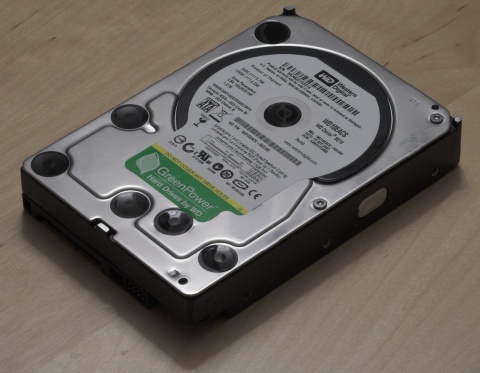Western Digital 'GreenPower" drive halves power consumption

The Western Digital "GreenPower" WD10EACS 1 terabyte hard drive is one the cheapest hard drives you can buy at this capacity ($300 including shipping) but it's also the most energy efficient. The drive has a technical specification of 4 watt idle which I measured fluctuating between 4 and 5 watts and a read/write specification of 7.5 watts which I measured at roughly 8 watts. Compared with the Seagate 7200.10 500GB that I've been using a lot in the last year including this RAID array, Western Digital's "GreenPower" drive is essentially half the power. I measured between 9 and 10 watts idle and 13 watt peak on the Seagate 7200.10.
To further reduce power consumption and noise output, it uses a just-in-time seek actuator that moves only at the necessary speed without sacrificing seek time performance. I was surprised by how quiet this drive was even when I put my ear next to it while it was operating outside of my PC's case. Silence is always an important metric for me and this drive is very silent.
One power consumption metric that most reviewers don't talk about is the spin-up power requirements. While this may not matter to many people, it does matter when you have a large storage array that's trying to spin up and you have to size the power supply to meet the worst case. The Seagate 7200.10 has a spin-up power consumption of 30 watts while the Western Digital WD10EACS spins up at around 14 watts. Multiply this by 15 hard drives in a storage server and you're looking at more than 400 watts of spin-up power requirements.
There is also a 500 GB and 750 GB version of this drive which for now only the 750 GB is available. Hopefully we'll see some really cheap 500 GB models on the market soon because 500GB is currently the bang/buck leader on storage. I'll follow up next week with some performance results on this new energy efficient drive.
Update 10/23/2007 - Pretty good comparison of performance at 1 TB here at Storage Review
